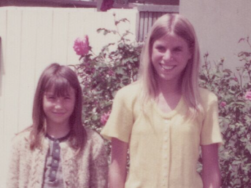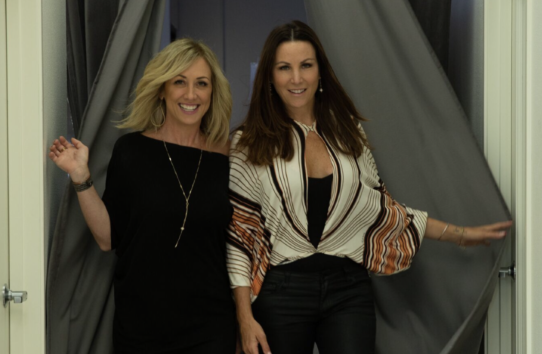.
 |
|
She Survived Child Abuse for Years
Here's What Everyone Gets Wrong About It
by
Jen Babakhan
She can't remember a time when abuse and neglect didn't affect her life, and yet entrepreneur, designer, and author Erin Cole has found a way to beat the odds. She hasn't just survived; she's thrived.
Cole's parents divorced during her infancy, and her mother's alcoholism set the family down a path of destruction. When her mother married a man Cole refers to as “Captain Jack,” things only got worse. Her new stepfather suffered from post traumatic stress disorder and often flew into fits of rage—with Cole and her siblings becoming his targets. (That's Erin Cole, on the left in the photo, with her sister Jenna Cole, and below, on the right, with Jenna McCarthy, her co-author.) |
Between the beatings with tree branches, periods of starvation, and being locked out of her home overnight from the time she was 5, Cole became desperate for a way out. She found it through self-reliance and the words of her caring grandmother, her primary lifeline in the turbulent waters of her childhood. Cole's memoir, The Size of Everything, shares her journey from a life of pain to the incredible success she enjoys today as a celebrated designer with collections featured around the world.
Here's what Cole says everyone gets wrong about child abuse and neglect—and what you can do to help:
Children experiencing abuse might not admit it
Asking a child if everything is OK at home is a start, but the fact is, those in an abusive situation are not likely to admit the truth. Kids who are abused are secret-keepers; kids who are neglected often don't even realize it, because it's all they've ever known. Cole's best advice is to pay attention and trust your gut.
Verbal and emotional abuse isn't visible
Abuse and neglect can take a million different forms, and many of them are invisible. Abusers prey on children because they're vulnerable and can be manipulated. Saying, “You'll get sent away forever if you tell anyone,” wouldn't work on an adult, but a kid will take that to heart all day long. Bruises and broken bones are easy to spot; an aching ego or battered spirit isn't.
 |
|
Substance abuse and mental illness often play a role
Things went from bad to worse when the younger of Cole's two older brothers died. “My mom spiraled into a depression she never recovered from. It was so awful that my oldest brother simply left to live with a friend, and my mother was admitted to a mental hospital,” she recalls. “On top of that, two alcoholics aren't exactly reliable breadwinners, so we frequently had very little money for things like clothes and food.”
Abused and neglected children are often bullied at school
“Even though my sister and I couldn't tell you how we were different from the other kids—was it the too-big socks or the too-short pants or the parents who forgot to pick us up from school?—we knew unequivocally that we were,” Cole shares. “Because of this, we were bullied mercilessly.”
To help your own kids, watch out for these signs that your child is being bullied. |
Abusers and victims come in all shapes and sizes The “bad guy” can be the seemingly sweet neighbor lady or the affluent doctor from church. They can even be parents or grandparents. The abused can be shy or outgoing, popular or withdrawn.
Teaching your kids about stranger danger isn't enough
Tragically, a vast majority of the time, the abuser is someone the child knows and trusts. People who hurt children know exactly how to manipulate them, typically with fear and threats of further abuse or punishment. Kids need to hear, “If anyone hurts you or threatens you, tell a trusted adult. You will never be punished for telling the truth.”
Abused children might feel survivor's guilt
“When the abuse at home and school became too much, I ran away to live with my dad and his girlfriend. I felt horribly guilty about leaving my mother alone with my stepdad (my older sister had already bolted by this point, too), but I couldn't take it there anymore,” Cole says. “It was at that point—I was 11—that I realized that no adult was going to save me.” Here are 10 more things women who escaped abusive relationships want you to know.
One person can make a life-saving difference
“Growing up, I didn't have a lot of positive adult influence in my life, but I did have an amazing grandmother. She always told me that I could do and be anything that I wanted, that I had talent and ambition, and I was going to do great things,” Cole says. “Her words were exactly what I needed. Because of her, I just knew that there was a better life for me out there.”
It is absolutely possible to break the cycle of abuse and neglect
Doing it takes courage, strength, faith, and the belief that you are worthy of having great things and great people in your life. Stopping the cycle is a choice that's available to everyone, no matter how tragic their circumstances. Read on for the 23 things experts wish you knew about domestic violence.
If you or someone you know needs help, call the National Sexual Assault Telephone Hotline at 1-800-656-4673 to be connected with a trained staff member from a sexual assault service provider in your area. Additional resources information and links are also available on RAINN.
|